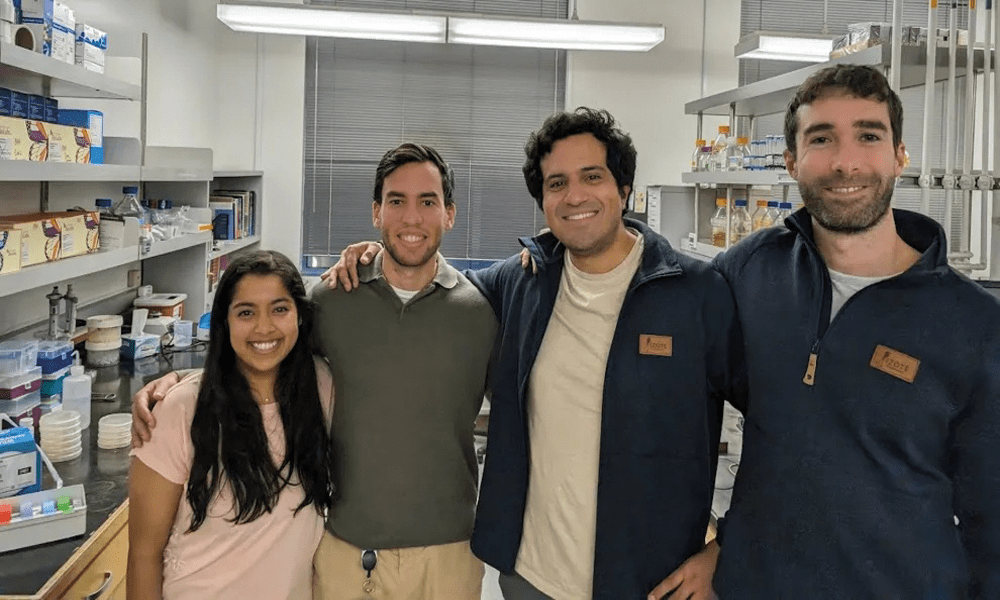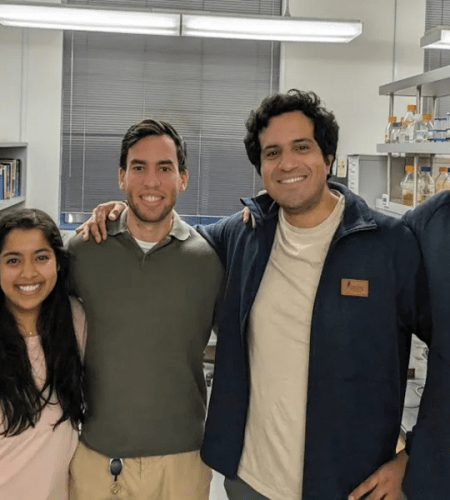Izote Biosciences takes in $2.6M to develop a fermentation process in 2024
Izote Biosciences takes in $2.6M to develop a fermentation process in 2024, Using precision fermentation as a manufacturing process to create bio-based products like chemicals, medicines, and even cultivated meat continues to be costly and not yet perfected for scalability.

Image Credits: Izote Biosciences / Izote Biosciences team, from left, Jyothsna Ganesh, Javier Santana, Victor Manuel Reyes-Umaña, and Samuel Atwood
Enter Izote Biosciences. The startup is developing a proprietary method that enables bacteria to “breathe without oxygen” inside a bioreactor. And it raised an oversubscribed pre-seed of $2.6 million last October to get it going.
The name Izote (pronounced ee-zoh-tay) was inspired by the national flower of El Salvador.
The technology was initially developed by Izote co-founder and chief technology officer Victor Manuel Reyes-Umaña, who has a background in microbiology and fermentation. He formed the company in 2022 and brought on Samuel Atwood as co-founder and CEO in August 2023. Atwood worked previously at McKinsey doing management consulting.
Atwood explained that Izote’s technology has its origins in synthetic biology, which is editing genomes of different organisms or compounds to create useful inputs. For example, using biotechnology to create therapies or new drugs. It is also being used in the agriculture, food, and chemical industries.
The company’s technology enables the making of what Atwood called “bio-based molecules” for several industries to yield low-cost, local feedstocks. Izote is using fermentation as its method, but Atwood described it as “a step change from the traditional fermentation process.”
The traditional method uses microorganisms engineered to produce specific compounds. These require oxygen to breathe. That means the entire system is designed around making sure the microbes have constant access to oxygen so they can survive. In turn, that determines what the bioreactor needs to look like, how large it should be, and the equipment needed.
“The costs of this imposes and complicates your processes significantly,” Atwood said. “Our innovation uses an alternative molecule to oxygen. It resembles salt, and it’s about 100,000 times more soluble than oxygen. Instead of pumping air and mixing your broth, our process involves dissolving the salt into the media, and your organisms will swim toward it.”
In this way, bioprocesses utilizing Izote’s anaerobic organisms can expect to see over 70% lower capital expenditures and gross margins of 50% to 100% higher, he said. And customers just need a simpler bioreactor to get more predictable scaling performance and an ability to extend fermentation runs longer, Atwood said.
Izote’s first applications will be in the fragrance and flavor industries, and the company is actively talking to large perfumeries. Plans include scaling the platform to enable the production of bio-based molecules across industries, like food and cosmetics.
The company is working on a few projects for customers but is still in the pre-revenue stage. After receiving a small amount of funding last year, Reyes-Umaña and Atwood decided to go after additional venture capital to build a team that could design and execute Izote’s process in a laboratory setting.
Embark Ventures and EGB Capital led the pre-seed round and were joined by Bee Partners, FTW Ventures, Nucleus Capital, Courtyard Ventures, Climate Capital Bio and Redstick Ventures. Bee Partners incubated the company, Atwood said. It has raised $2.6 million in total.
It will take 18 months to identify what Izote’s launch molecules will be and demonstrate that the molecules can be produced in the lab and at a productivity of at least 50% better than anything currently on the market, Atwood said.
“Throughout the last 10 to 15 years, people have gotten excited about synthetic biology and that you can make almost anything with microorganisms,” Atwood said. “However, we’ve observed companies start with the product and then assume the economics would follow. That’s been a failure point for this industry. Instead, we’re starting with a molecule, or a set of molecules, where we know from the start the economics at scale are going to be competitive. Then we grow in that way.”
See More: Izote Biosciences takes in $2.6M to develop a fermentation process sans oxygen
Subscribe to our email newsletter to get the latest posts delivered right to your email.


Comments